Text
A global toolkit that aims to support the integration of human rights in Member States' counter-terrorism strategy and policy.
The Office of the United Nations High Commissioner for Human Rights (OHCHR) developed a global toolkit that aims to support the integration of human rights in Member States' counter-terrorism strategy and policy. As part of the launch of the toolkit, OHCHR will be organizing a panel discussion on why human rights matter in counter-terrorism strategy and policy.
Watch the OHCHR launch event - human rights toolkit!
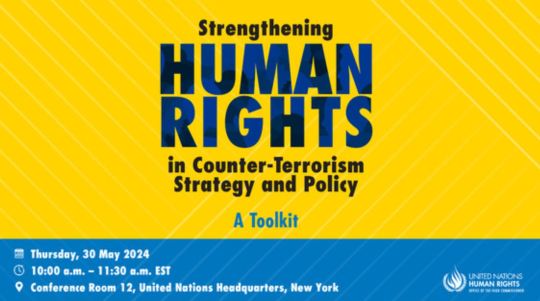
#victims of terrorism#panel discussion#counter terrorism week#strengthencollaboration#innovative tools#Office of the United Nations High Commissioner for Human Rights#ohchr#conference room 12#unhq#human rights matter
0 notes
Text
"Condemning Hostage-Taking in Israel on October 7 as a Psychological Tool of Terrorism" - UN Security Council Arria-Formula Meeting.
Permanent Missions of Albania, Austria, Belgium, Canada, Croatia, Czechia, France, Germany, Hungary, Israel, Italy, Malta, the Netherlands, New Zealand, Romania, the United Kingdom to the United Nations.
Watch "Condemning Hostage-Taking in Israel on October 7 as a Psychological Tool of Terrorism" - UN Security Council Arria-Formula Meeting!

#Conference room 11#UNHQ#arria formula meeting#counter terrorism#terrorist acts#psychological tool#psychological torture#permanent missions#permanent representatives#terrorism#october 7 massacre#october 7 attacks#israel palestine#Hostages#meetings
0 notes
Text
Open meeting of the Counter-Terrorism Committee - Building resilience of communities to prevent radicalization to terrorism.
The objective of the open meeting is to convene a broad range of experts to discuss experiences, identify the latest trends, and share best practices on building community resilience to prevent and counter radicalization to terrorism. The open meeting will also provide an opportunity to strengthen collaboration with all relevant United Nations bodies and stakeholders in line with Council resolution 2617 (2021).
In addition, the open meeting will help to foster understanding of the issues and challenges posed by the use of use of new and emerging technologies, including AI, for terrorist purposes, as well as explore ways to build resilience to terrorism through the use of these technologies.
Related Sites and Documents
Concept Note
Agenda
Watch the Open meeting of the Counter-Terrorism Committee - Building resilience of communities to prevent radicalization to terrorism.
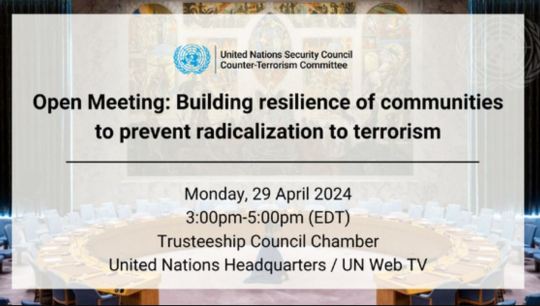
#Emerging Technologies#artificial intelligence#ai#Terrorism#resilence to terrorism#open meeting#counter radicalization#Community Resilience#strengthencollaboration#united nations headquarters#meetings#counter terrorism
0 notes
Text
Building resilience of communities to prevent radicalization to terrorism.
Member States have the primary responsibility for countering terrorist acts, including in building resilience of communities against radicalization to terrorism. The Security Council recognizes that acts of terrorism are most effectively prevented and countered through a comprehensive approach that includes actors from all sectors of society.
The objective of the open meeting is to convene a broad range of experts to discuss experiences, identify the latest trends, and share best practices on building community resilience to prevent and counter radicalization to terrorism. The open meeting will also provide an opportunity to strengthen collaboration with all relevant United Nations bodies and stakeholders in line with Council resolution 2617 (2021).
In addition, the open meeting will help to foster understanding of the issues and challenges posed by the use of use of new and emerging technologies, including AI, for terrorist purposes, as well as explore ways to build resilience to terrorism through the use of these technologies.
Watch the Open meeting of the Counter-Terrorism Committee - Building resilience of communities to prevent radicalization to terrorism.
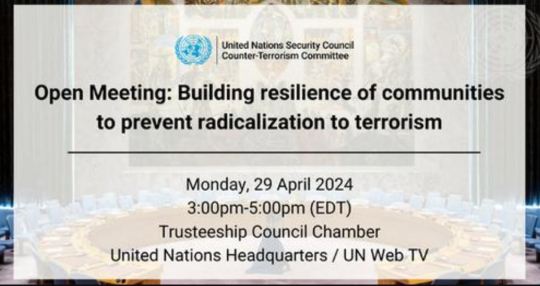
#united nations trusteeship council#united nations headquarters#counter radicalization#prevent radicalization#planel discussion#Counter terrorism committee#united nations security council
0 notes
Text
The impact of unilateral coercive measures on global counter-terrorism efforts.
Unilateral Coercive Measures (UCMs) are widely imposed by Western powers in violation of international law to exert political pressure.
The purpose of this meeting is to critically examine contribution of UCMs to exacerbating insecurity, fostering resentment, radicalization, and hostility among affected populations.

#global counter-terrorism efforts#united nations security council#arria formula meeting#international laws#unsc#Unilateral Coercive Measures (UCMs)#meetings
0 notes
Text
Open briefing of the Counter-Terrorism Committee on South-East European Member States' implementation of the relevant Security Council resolutions and the Committee's visit recommendations.
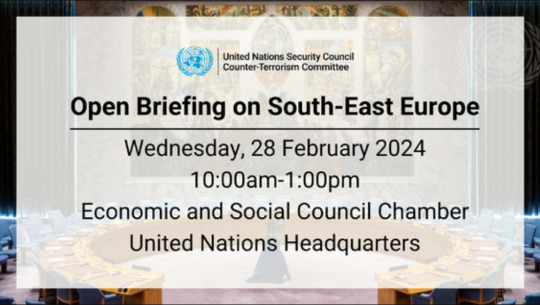
The briefing will provide an opportunity to take stock of the measures adopted and progress made by Member States of the sub-region in the area of implementing relevant Security Council resolutions on counter-terrorism and the Committee's recommendations.
Watch the Open briefing of the Counter-Terrorism Committee on South-East European Member States' implementation of the relevant Security Council resolutions and the Committee's visit recommendations.
#counter terrorism week#victims of terrorism#unitetocounterterrrorism#panel discussion#member states#measure adopted#progress made
0 notes
Text
Threats to international peace and security caused by Terrorist acts - United Nations Security Council, 9405th meeting.
Seventeenth report of the Secretary-General on the threat posed by ISIL (Da'esh) to international peace and security and the range of United Nations efforts in support of Member States in countering the threat (S/2023/568).
#PeaceAndSecurity#Terrorism#counterterrorism#meetings#united nations security council#victims of terrorism#survivors of terrorism
0 notes
Text
The threat posed by Da'esh - United Nations Security Council, 9405th meeting.
Briefing to the Security Council by Natalia Gherman, Assistant Secretary-General (ASG) and Executive Director of the Counter-Terrorism Committee Executive Directorate (CTED), on the 17th report of the Secretary-General on the threat posed by Da'esh.
#Counter-Terrorism Committee Executive Directorate (CTED)#Assistant Secretary-General (ASG)#meetings#counterterrorism#Terrorism#Daesh#united nations security council
0 notes
Text
The threat posed by Da'esh - United Nations Security Council, 9405th meeting.
Briefing to the United Nations Security Council members by Vladimir Voronkov, Under-Secretary-General for Counter-Terrorism, on the 17th report of the Secretary-General on the threat posed by Da'esh.
Madam President, Excellencies,
I thank the Security Council for the opportunity to present the seventeenth report of the Secretary-General on the threat posed by Da'esh to international peace and security, and the United Nations efforts in support of Member States to counter the threat.
I would like to start by expressing my sincere condolences to the governments and people of all Member States who have suffered from terrorism.
Earlier this week, the Secretary-General helped mark the International Day of Remembrance of and Tribute to the Victims of Terrorism 2023. The horrific impact of terrorism on the lives and livelihoods of so many people give impetus to our common efforts to counter and prevent it.
The victims and survivors of terrorism continue to serve as a powerful reminder of the importance of sustaining multilateral efforts against Da'esh and terrorism in all its forms and manifestations.
On 19 June, the United Nations Office of Counter Terrorism together with the Group of friends of victims of terrorism held a dedication ceremony to plant the Victims of Terrorism Solidarity Tree at UN headquarters. This tree will stand as a timeless and powerful symbol of the commitment of the United Nations and the international community to protect and promote the rights of victims of terrorism.
Madam President, Excellencies,
I am pleased that Assistant Secretary-General and Executive Director of the Counter-Terrorism Executive Directorate, Ms. Nathalia Gherman, is joining me today, to present this report, which our offices prepared jointly with the Analytical Support and Sanctions Monitoring Team, led by Mr. Justin Hustwitt.
As highlighted in this and previous reports, Da'esh and its affiliates continue to constitute a serious threat in conflict zones and neighbouring countries. However, the threat level remains low in non-conflict areas. This analytical distinction can obscure what is the complex, context- specific and dynamic nature of how these groups operate and evolve and their impact on international peace and security.
In parts of Africa, the continued expansion of Da'esh and affiliated groups, as well as the increasing level of violence and threat, remain deeply concerning.
The Da'esh affiliate in the Sahel is becoming increasingly autonomous and increasing attacks in Mali, as well as Burkina Faso and the Niger. The confrontations between this group and an Al- Qaida affiliate in the region, coupled with the uncertain situation after the coup d'état in the Niger, present a complex and multi-faceted challenge.
In the Democratic Republic of the Congo, attacks by terrorist and other armed groups have also risen, with continued clashes between Government forces and terrorist groups. In the eastern region of the country, some 500 persons have perished due to terrorist violence.
Conflict and instability in Sudan have also renewed the attention on the presence and activity of Da'esh and other terrorist groups in that country.
Beyond Africa, the situation in Afghanistan is growing increasingly complex, with fears of weapons and ammunition falling in the hands of terrorists now materializing. The in-country operational capabilities of Da'esh's so-called Khorasan province, sanctioned as ISIL-K, has reportedly increased, with the group becoming more sophisticated in its attacks against the Taliban and international targets.
Moreover, the presence and activity of some 20 different terrorist groups in the country, combined with the repressive measures put in place by the Taliban de facto authorities, the absence of sustainable development and a dire humanitarian situation, pose significant challenges for the region and beyond.
This complex picture remains despite successful counter-terrorism initiatives by Member States. There has been progress in targeting Da'esh finances and leadership cadres, including the death of Da'esh leader earlier this year, confirmed by Da'esh itself after the report's completion. These measures had a notable effect on the group's operations in Iraq and the Syrian Arab Republic, as well as elsewhere.
Counter-terrorism initiatives in Egypt, Mozambique and Yemen have also significantly limited the ability to conduct operations. Yet, the risk of resurgence remains.
As a result of counter-terrorism efforts, Da'esh has moved to adopt less hierarchical and more networked, decentralised structures, following Al-Qaida's footsteps, with increased operational autonomy by its affiliated groups. While there is little evidence that the core leadership is exercising command and control of regional affiliates - financial, propaganda and other connections remain.
Perhaps most notably, the typical surge in Da'esh violence during the month of Ramadan did not materialize in 2023.
The situation in camps and detention facilities in the northeast of the Syrian Arab Republic that hold individuals with alleged links to Da'esh and other terrorist groups has been dire for many years and is unlikely to improve soon. Although the increased pace of repatriations, mainly by Iraq, is welcome, tens of thousands of people, mostly women and children, are still stranded in camps and detention facilities., with unpredictable consequences for regional and international security.
Madam President, Excellencies,
I offer four key observations for this Council's consideration.
First, compliance with international law, including international human rights law and humanitarian law, remains the essential bedrock for the success of counter-terrorism efforts. Actions that contravene these legal obligations only undermine global efforts against Act of terrorism. Effective counter terrorism requires inclusive approaches and gender-responsive measures.
Second, the persistent challenges posed by terrorism underline the need for counter-terrorism initiatives to be firmly grounded in political strategies for resolving the Armed Conflicts that fuel terrorism the most. Force alone cannot lead to changes in the conditions conducive to terrorism.
Indeed, the use of force, with no backing of clear strategy and not anchored on international law, can be counter-productive, fuelling more violence, aggravating grievances exploited by terrorists and creating conditions conducive for the proliferation of terrorist groups.
And in this regard, the Secretary-General in his policy brief on A New Agenda for Peace, has called for a new generation of counter-terrorism operations, led by African partners with a Security Council mandate under Chapters VII and VIII of the Charter of the United Nations, with guaranteed funding through assessed contributions. These operations should align with the full range of the United Nations tools and mechanisms for responding to crises.
Third, prevention. The nature of the threat posed by Da'esh underscores the need for more complementarity between security responses and preventive measures. Further efforts are required to prioritize and significantly increase investment in prevention efforts.
The integrated and balanced implementation of the four pillars of the United Nations Global Counter Terrorism Strategy would help ensure this very point.
Finally, developments in some parts of Africa are deeply concerning and interconnected with existing conflicts and local grievances. The African Counter-Terrorism Summit being organized by the United Nations Office of Counter Terrorism and the Government of Nigeria to be held in Abuja next year, will offer an opportunity to redouble international support and explore transcontinental approaches to address this situation.
Madam President, Excellencies,
The General Assembly's adoption of resolution 77/298 on its eighth review of the United Nations Global Counter-Terrorism Strategy sustained the long-standing multilateral consensus on counter-terrorism.
The adoption of this resolution should serve as a reminder that consensus does not come easy. However, once achieved, it reaffirms the unity of Member States against terrorism.
Countering and preventing terrorism require long-term commitment as well as continued and coordinated efforts. I welcome the support expressed by all stakeholders at the 2023 United Nations Counter-Terrorism Week in New York to to counter terrorism and look forward to the close collaboration with partners on key priorities identified during the High- Level Conference of Heads of Counter-Terrorism Agencies of Member States.
The United Nations, including the Office of Counter-Terrorism and the Global Counter-Terrorism Coordination Compact, will continue to support Member States in their endeavour to address the scourge of terrorism.
Thank you.
#counterterrorism#meetings#Terrorism#PeaceAndSecurity#VictimsofTerrorism#Global Counter-Terrorism Coordination Compact#Counter-Terrorism Week#victims of terrorism#survivors of terrorism#United Nations Office of Counter Terrorism#united nations security council
0 notes
Text
Statement by the UNOCT Under-Secretary-General at the High-level Event for the International Day of Remembrance of and Tribute to the Victims of Terrorism on 21 August 2023.
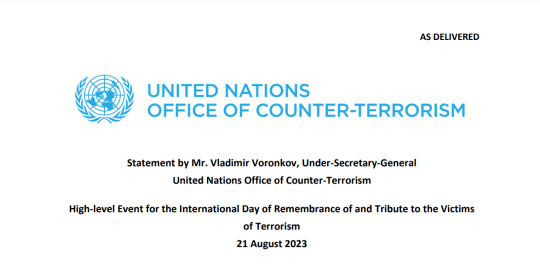
Excellencies, Ladies and Gentlemen, dear friends,
Today we commemorate the sixth International Day of Remembrance of and Tribute to the Victims of Terrorism. Terrorism continues to threaten peace and security leaving, in its wake, hundreds of thousands of victims and survivors. Defeating this scourge to prevent future victims is crucial. But we must also ensure that those whose worlds have been changed forever receive the support they need to rebuild their lives and realize their rights.
The international community has made important progress in recent years.
Last September, the first United Nations Global Congress of Victims of Terrorism marked a new milestone. Together, we have charted a progressive and forward-looking international agenda in support of victims of terrorism. This year we are maintaining a strong focus on
victims and survivors of terrorism.
Member States have re-committed to strong language on victims with the eighth, consensus review of the United Nations Global Counter-Terrorism Strategy. They are now preparing to review the resolution of the General Assembly on enhancement of international cooperation to assist victims of terrorism. We also continue to strengthen the capacity of Member States to support victims and survivors of terrorism. The United Nations Office on Counter-Terrorism and Office on Drugs and Crime work closely together in this regard.
Finally, I am very proud that, in June, we dedicated a beautiful, young Zelkova tree in the gardens of the United Nations Headquarters,
A tree as a permanent symbol of solidarity and tribute to the victims and survivors of terrorism across the globe.
Dear Victims and Survivors, This Day is about you. It reminds us that no matter how long ago an attack occurred you continue to live and cope with its aftermath for the rest of your lives. This Day provides a moment of humility and reflection during which the world stands alongside you.
I have met many victims from around the world. Their scars may fade over time but their pain, is lifelong. And across every continent, they share an overwhelming commonality: They feel deeply that no-one should have to go through, what they went through. That is
why, this year’s theme for our International Day is legacy -- finding hope and building together a peaceful future free from terrorism.
This theme was chosen following consultations with our victims of terrorism associations network over the past year. We want to highlight the very human and common desire of victims to make sense, of what happened and to find purpose, to change things for the better. And so, on this International Day, I am proud to announce that the United Nations Office of Counter-Terrorism is launching “The Legacy Project.” A new documentary gallery through social media to showcase how victims and survivors are creating a positive legacy in the aftermath of terrorism. What shines through this project is the hope and resilience of victims and survivors, their courage and strength, and how, by remembering the past, they are imprinting their legacy in our collective memory.
I would like to thank the victims who shared their testimonies with us today. And I encourage you all to visit the project gallery and help amplify the legacy of victims and survivors of terrorism.
Excellencies, Ladies and Gentlemen, Two days ago, marked the 20th anniversary of the Canal Hotel bomb attack in Baghdad, Iraq,
on 19 August 2003. On that tragic day which we now remember as the World Humanitarian Day we lost 22 people. Many of them staff members of the United Nations working to build peace, security, and prosperity for humankind, including Sergio Vieira de Mello, the Special Representative to Iraq.
Terrorism has no respect for nationality, faith, gender, age, or location. We must all, in our shared bond as human beings, stand up against it, and work together, with the victims, to
build a better future. The United Nations stands with you.
Thank you.
Statement by Mr. Vladimir Voronkov, Under-Secretary-General
United Nations Office of Counter-Terrorism at the High-level Event for the International Day of Remembrance of and Tribute to the Victims of Terrorism on 21 August 2023.
#moment of humility#moment of reflexion#statements#UNOCT#Legacy project#victims of terrorism#survivors of terrorism#21 august#International Day of Remembrance of and Tribute to the Victims of Terrorism
0 notes
Text
Legacy: Finding Hope and Building a Better Future.
The United Nations marks the sixth commemoration of the International Day of Remembrance of and Tribute to the Victims of Terrorism on 21 August 2023.
#unitetocounterterrrorism#counter terrorism week#united nations office of counter-terrorism (unoct)#panel discussion#Tribute to the victims of terrorism#21 august#Legacy
0 notes
Text
Imprint suvivors’ legacy in our collective memory.

Through its counter terrorism office, the UN strives to help Member States advance victims’ rights and respond to their needs. In his address, Mr. Voronkov, who has met many victims of terrorism around the globe said that “their scars may fade over time but their pain, is lifelong.”
“Across every continent, they share an overwhelming commonality: they feel deeply that no-one should have to go through what they went through,” he added.
The social media-based Legacy Project showcases how victims and survivors are creating a positive legacy in the aftermath of attack. It highlights hope, resilience, courage and strength, imprinting suvivors’ legacy in our collective memory.
Mr. Voronkov reflected on the recent 20th anniversary of the Canal Hotel bomb attack in Baghdad, Iraq, on 19 August 2003.
Now commemorated as World Humanitarian Day, 22 people died in that tragic terrorist assault on the UN’s headquarters there.
“Terrorism has no respect for nationality, faith, gender, age, or location. We must all, in our shared bond as human beings, stand up against it, and work together, with the victims, to build a better future,” said the UNOCT chief.
#Overwhelming commonality#Legacy project#unitetocounterterrrorism#21 august#voices of survivors#victims of terrorism#survivors of terrorism
0 notes
Text
The “extraordinary work” of victims and survivors who have resolved to use their experiences to bring about change.
The centrepiece of the day was a high-level online event entitled, Legacy: Finding Hope and Building a Peaceful Future, which brough together Mr. Guterres, the head of the Office of Counter-Terrorism (UNOCT) Vladimir Voronkov, the co-Chairs of the Group of Friends of Victims of Terrorism, Iraq and Spain, as well as victims and survivors of terrorism.
The United Nations chief explained that the Legacy Project amplifies the “extraordinary work” of victims and survivors who have resolved to use their experiences to bring about change.
youtube
He highlighted the need to support victims and stand with their families, “changed forever” by attacks. Mr. Guterres stressed the importance of working together to ensure that the lives ravaged by terrorism are not forgotten and to “resolve to build a more peaceful future”.
#Group of Friends of Victims of Terrorism#Office of Counter-Terrorism (UNOCT)#united nations secretary general#Legacy project#21 august#unitetocounterterrrorism#needs of victims#Youtube
0 notes
Text
Help survivors’ testimonies be heard.
Paying respect to the thousands lost or harmed through terrorist attacks around the world each year, the United Nations is launching a project to help survivors’ testimonies be heard, Secretary-General António Guterres said on Monday’s International Day of Remembrance and Tribute to the Victims of Terrorism.
0 notes
Text
Leveraging the Potential of Cities in P/CVE: The Role of Mayors and other Local Leaders implementing the UN Globa Counter-terrorism Strategy ( 2023 Counter-terrorism week Side-Event)
On 23 June 2023, the Strong Cities Network and EU will host a 90-minute side-event at the United Nations 2023 Counter-terrorism Week, inviting mayors and other local leaders to share experiences, good practices and challenges with preventing and responding to violent extremism in their communities. Watch the panel discussion!

#counter-terrorism week#unitetocounterterrrorism#panel discussion#mayors#local leaders#violent extremism#side events#Strong Cities Network
0 notes
Text
UNOCT moving closer to Member States – the activity of the UNOCT programme offices (2023 Counter-terrorism Side-Event)
Hungary, Kingdom of Morocco, Kingdom of Spain and Qatar are proud host countries of the UNOCT programme offices. This event aims at providing an overview of the regional field presence of the UNOCT, and presenting their activities. Watch the panel discussion!

#UNOCT Programme offices#counter terrorism week#unitetocounterterrrorism#side events#acts of terror#counter terrorism#technical assistance
0 notes
Text
Ungoverned Online Spaces and Grey-Area Content: Challenges of Addressing Terrorism-Adjacent and Terrorist-Driven Content Across Jurisdictions and Multistakeholder Solutions (2023 Counter-Terrorism Week Side-Event)
This panel offers expertise on the issue of online ungoverned spaces and grey-area content that present challenges to the current counterterrorism framework structure. When we know that there are illegal terrorist operated websites or online games, where can we work with industry to help them moderate this content or with law enforcement to find alternative avenues of removal, especially across jurisdictional differences.
Where content is "lawful but awful" or borderline, what are the avenues available to work together to assess and address this content through other means? How can we better understand and communicate the danger of this content, while protecting rights?
The United Nations Counter-Terrorism Week is a biennial gathering of Member States and international counter-terrorism partners. The Third Counter-Terrorism Week (CT Week) is scheduled to take place from 19 to 23 June 2023 at the UN Headquarters in New York.
Wach the panel discussion!

#counter-terrorism week#unitetocounterterrrorism#panel discussion#online games#online spaces#law enforcement
0 notes